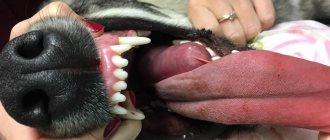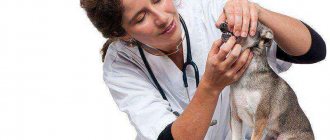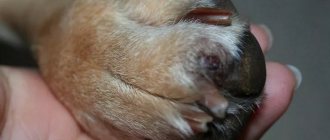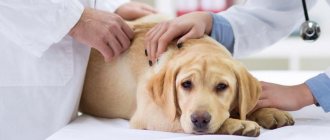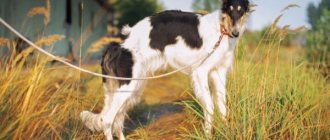A common upper respiratory tract disease in pets is laryngitis. The inflammatory process in the larynx occurs, as a rule, due to hypothermia of the animal and a decrease in the body's resistance. Veterinarians distinguish between acute and chronic course of the disease. Treatment is complex and includes not only antibacterial drugs, but also restorative therapy.
Reasons for the development of laryngitis
In veterinary medicine, it is customary to divide the disease into primary and secondary. The most common causes of primary laryngitis include the following factors:
- Hypothermia of the body. Swimming in a cold open body of water, a long walk in bad weather, keeping a pet in a damp and cold room with drafts often lead to illness. Animals often get sick after water procedures in the winter season.
- Consuming cold or hot food, cold water during the hot season or after intense physical activity. Violation of the temperature regime when feeding and watering a dog leads to irritation of the mucous membrane of the larynx and its inflammation.
- Keeping a dog in a gas-filled, smoky room. Exhaust gases, construction dust, and tobacco smoke negatively affect the condition of the epithelium of the upper respiratory tract and cause its destruction.
- Unqualified probing procedure (endoscopy, bronchoscopy).
In addition to primary inflammation, dogs often experience a secondary form of the disease. In this case, laryngitis is one of the symptoms of an infectious pathology. Veterinary experts include the following causes of secondary illness:
- Adenoviral infection . The viral disease is highly contagious and is called “aviary” disease. The virus infects the mucous membrane of the upper respiratory tract, causing infectious laryngitis.
- Mycoplasmosis . The pathogenic pathogen causes a generalized infection, including inflammatory processes in the pharynx.
- A pneumonic form of canine distemper . Severe illness is accompanied by fever, inflammation of the upper respiratory tract and lungs.
Factors predisposing to laryngitis are the animal’s weak immune system, concomitant diseases, advanced age, and an allergic reaction. In veterinary practice, there is a breed predisposition to the disease. Representatives of brachycephalic breeds, due to the peculiarities of the anatomical structure of the upper respiratory tract, are more often susceptible to laryngitis, as well as many other pathologies of the respiratory system.
We recommend reading about colds in dogs. You will learn about the symptoms of the disease, treatment with drugs and folk remedies, and prevention of colds. And here is more information about pneumonia in dogs.
Prevention measures
Quite often, laryngitis in dogs becomes the most common disease due to the owner’s lack of attention and inappropriate living conditions, with poor and unbalanced nutrition. This is why it is so important to provide your pet with proper living conditions.
First of all, this is to adhere to the principles of proper nutrition, give the dog food and water that is not too hot/cold, and avoid or minimize walks in cold, damp weather. If your dog lives in a large metropolis, you should not walk it near highways, but rather take it to a park area. During walks, you need to monitor your dog and eliminate or minimize contact with sick and wild animals.
Autumn has arrived, and with it the time for inflammatory diseases of the respiratory system. Not only people suffer from them, but also their pets. Most often, the presence of pathology can be guessed by the cough your pet develops. Of course, this could be, but your dog could just as well have developed laryngotracheitis: this happens in dogs.
The name of the disease consists of two words: larynx (that is, larynx) and trachea (aka trachea). The suffix "itis" indicates inflammation. Thus, this term refers to complex inflammation of the larynx and trachea.
The etiology of this phenomenon is quite diverse: on the one hand, the pathology can be caused by environmental factors (inhalation of irritants, asbestos dust, etc.), but still more often the disease occurs under the influence of pathogenic microorganisms.
It should be noted that such laryngotracheitis does not appear in all cases “thanks to” initially “bad” bacteria. Often the disease develops against the background: due to severe hypothermia, the animal’s body is greatly weakened, and opportunistic microflora, which in other cases could not cause much harm to it, quickly becomes active and causes severe inflammation. This often happens with hunting dogs, which during the hunting season can bathe repeatedly, bringing the owner shot game.
We must also not forget about the likelihood of a traumatic origin of the pathogenic process.
“Trauma” in this case refers to the consequences
of feeding the dog, especially.
Even if the dog is lucky and a piece of bone does not penetrate the esophagus and trachea, fragments of such “delicacies” often leave deep scratches on the surface of the larynx.
In more severe cases, pieces of bone reach the trachea (directly through the wall of the esophagus).
Since dog food is rarely sterile, a huge amount of bacteria gets into the wounds, and inflammation quickly begins.
It happens that inflammation of the larynx and trachea is not an independent disease, but a consequence of bronchitis or bronchitis suffered by the animal.
With a constant cough, which often accompanies these pathologies, the tissues of the larynx and trachea experience strong mechanical stress, as a result of which multiple microtraumas appear on them. The latter are readily contaminated by microflora, as a result of which inflammation again develops.
Oddly enough, but sometimes feeding is indirectly involved in the development of inflammation of the larynx and trachea.
No, we are not talking about hot food, but about
quality
. If it lacks vitamins A and E, the mucous membranes of many internal organs, including the respiratory system, suffer. In such cases, it is much easier for pathogenic microflora to penetrate damaged barriers and cause inflammation.
Symptoms of the disease in dogs
The effect of a negative factor leads to hyperemia and swelling of the mucous membrane, the death of protective epithelial cells, and the penetration of pathogenic microorganisms. As a result, an inflammatory process develops in the pharynx. The waste products of microbes enter the blood and cause a general reaction in the body. With laryngitis, the owner observes the following clinical picture:
- Change in your pet's voice. The barking becomes rough, hoarse, and dry.
- Cough. The symptom usually develops simultaneously with changes in voice. Cough without phlegm, dry and painful. The pain manifests itself in the fact that coughing is often accompanied by vomiting.
When feeding the animal, especially dry food, the symptom intensifies.
- The dog lies with its neck extended. This position reduces pain and allows you to breathe normally.
- The animal is depressed, lethargic, apathetic.
- Decreased appetite or complete refusal to feed.
- On palpation, pain is detected in the larynx area. The manipulation causes a reflex cough in the dog.
- In severe cases, shortness of breath is observed. As a rule, this symptom indicates that inflammation spreads to the trachea and bronchi.
- The general body temperature with catarrhal inflammation remains within normal limits. With the development of lobar laryngitis, a dog experiences fever, muscle tremors, and cyanosis of the mucous membranes.
In some cases, owners may notice discharge from the nose and eyes, but these symptoms are not typical with laryngitis.
For information on the types of coughs in dogs, watch this video:
Diagnostic methods
When making a diagnosis, the veterinarian takes into account the conditions under which the pet is kept and the effect of negative factors. A clinical examination of your pet allows you to determine the presence of inflammation of the pharynx by characteristic symptoms (dry cough, soreness). Using laryngoscopy in a specialized institution, the source of inflammation and its nature are visually determined.
In order to exclude a foreign object in the pharynx, the presence of pathology in the bronchi and lungs, the animal undergoes an x-ray examination. Differential diagnosis for infectious diseases accompanied by inflammatory processes in the pharynx is made on the basis of serological and microbiological diagnostic methods. An additional test is a clinical blood test.
Preventive actions
In general, laryngitis is a disease of those dogs whose owners do not pay due attention to the conditions of keeping their four-legged pets. To ensure that your dog never gets it, there is not much you need to do. Firstly, do not give your pet too hot or cold food, do not take your dog for a walk if it is very cold and windy outside.
In urban conditions, it is more difficult to protect a dog from damage to the larynx, but even in this case there are more or less reliable methods. First of all, do not walk with your dog near highways. Try, if possible, to use forest parks for exercise. Fresh air will clearly benefit not only you, but also your tailed friend. Another danger of city apartments, dry air, can also be eliminated. To do this, you just need to buy a cheap humidifier. For “aesthetes” we can recommend an aquarium.
Treatment of a shaggy friend
The symptoms of laryngitis should never be ignored. If complications occur, there is a high risk of swelling of the larynx and the development of suffocation, which is life-threatening for the pet. A veterinarian should prescribe treatment for the animal, taking into account the nature of the inflammatory process. First of all, it is necessary to normalize the conditions of detention.
A sick dog should be placed in a warm, dry, draft-free room. In the cold season, walking is reduced to a minimum or stopped altogether. The effect of toxic fumes, cigarette smoke, and carbon monoxide on a sick pet is excluded.
The animal must be given warm water to drink, and the food must also be preheated. In case of laryngitis, the owner must make adjustments to the animal’s diet and remove rough and dry food from it. In order not to irritate the mucous membrane of the inflamed organ, the animal is fed wet porridges and broths.
A veterinarian, as a rule, prescribes a comprehensive treatment of the disease, which includes the use of antibacterial agents, sulfonamides, painkillers and anti-inflammatory drugs. Antibiotics are an integral part of the treatment of laryngitis.
The use of Amikacin, Ampicillin, Sinulox, Ciprofloxacin, Cephalen, Cobactan, Enrofloxacin has a good effect. Antibacterial drugs are often used in combination with sulfonamides: Sulfamethazine, Sulfamerazine, Norsulfazole, etc.
Antibiotics for the treatment of laryngitis
In order to relieve the sick dog, expectorants are prescribed, for example, Bromhexine or Terpinhydrate. On the recommendation of a veterinarian, medicinal herbs in the form of decoctions can be used to remove sputum. For this purpose, anise fruits, thermopsis grass, and mullein are used.
If laryngitis is allergic, the animal is prescribed antihistamines: Suprastin, Tavegil, Loratadine. In case of severe pain syndrome, painkillers can be used. In some cases (with difficulty breathing, shortness of breath), the animal is prescribed vasodilators, for example, Eufillin.
Local procedures in the form of irrigation of the laryngeal mucosa with antiseptic astringent solutions have a good therapeutic effect. For this purpose, solutions of calcium chloride, Furacilin, Iodinol are used.
To strengthen the immune system and increase the body's defenses, a sick dog is given vitamin therapy. Your veterinarian may prescribe injections, such as ascorbic acid, or recommend boluses (B vitamins, vitamin A). Multivitamin complexes improve the regeneration of epithelial tissue, which contributes to the rapid restoration of damaged laryngeal tissue.
The use of thermal physiotherapy can speed up recovery: ultraviolet irradiation, solux lamps, UHF therapy.

